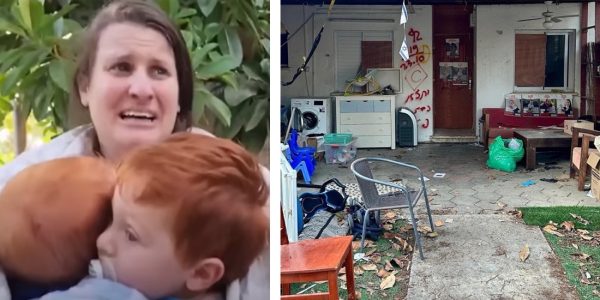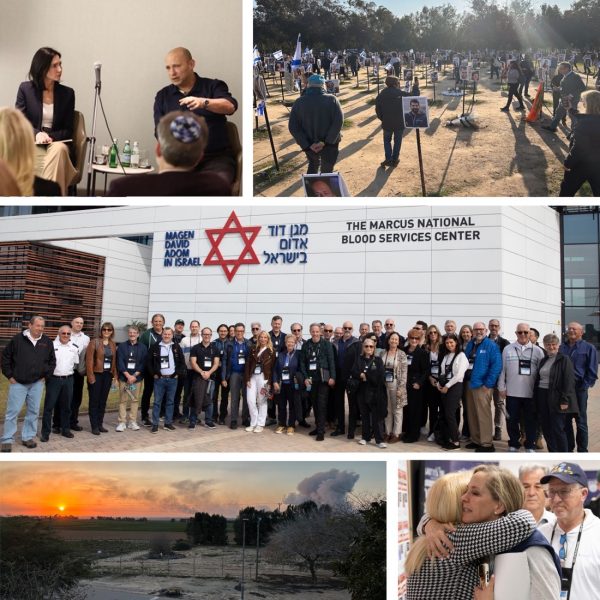By Doron Krakow
Seventy-Five to One Hundred to One
They came from JCCs across the continent. Forty of them. Lay leaders and executives. Members of the board of JCC Association and local boards. They came to see. To listen. To learn. They came to bear witness. It started on Sunday evening in Tel Aviv, but its origins go back much further. In fact, it began as something else altogether.
In 2022, the leaders of JCC Association of North America announced their intention to organize its largest-ever delegation to Israel to celebrate the country’s 75th anniversary year. The triumphant achievements of the modern State of Israel, whose independence rose from the ashes of the Holocaust and was declared in the face of military onslaught. In just 75 years, notwithstanding six wars and decades of terror, it has become the strongest and most successful nation in the region and, by any number of measures, in the world.
We would come to join in the celebration. And for the first time in our 107-year history, we would convene a board meeting here as part of a 10-day retreat. But once more, the unanticipated compelled us to adjust our plans. Instead of the intended celebration, we came in solidarity, our first day coinciding with the 100th day since October 7. The 100th day of the war that Israel’s vaunted intelligence apparatus, the indomitable Israel Defense Forces (IDF) and its politically hardline government, never saw coming. The 100th day since the Nova rave—a celebration of peace and love and life—became a killing field, a scene of unimaginable horrors. The 100th day of captivity for 136 hostages still in the hands of terrorist butchers. The 100th day of active duty for IDF reservists, the country’s citizen army, comprising soldiers of every description who left homes and families, businesses, and university studies. More than 300,000 of them—4% of the entire population in uniform, in combat. The 100th day since the sharp divisions in Israeli society melted away in the face of an unprecedented assault on the homes and families in communities around Gaza, leaving in its wake a sense of unity previously unknown. The 100th day of national trauma, a trauma shared by Israelis of every background and description. The 100th day and counting.
It doesn’t matter what you think you know. It doesn’t matter how much you’ve read. How many hours of news you’ve watched. How many times you’ve talked about it. It is impossible to truly understand what’s happening here until you’ve seen it yourself. And so, we came and that’s what we did. Over four intense days, we were greeted by Israel’s foremost leaders, including President Herzog and former Prime Minster Bennett. We were briefed by leading analysts from politics, journalism, and intelligence. But that was only context.

Words fail me. How do I do justice to the time we spent with those who lived through it? Those who are still living through it? The young mother in Sderot whose 4-year-old daughter, already accustomed to red alerts that signal impending strikes of inbound rockets with only seconds of warning, now terrified of the sounds of passing cars and the voices of men? The staff of an eerily quiet Matnas (an Israeli JCC) who travel the length and breadth of the country to bring programs and services to its relocated members, like so many others evacuated from communities bordering Gaza and Lebanon, living in hotels and temporary accommodation of every description? The fathers of captive sons? Citizen soldiers sleeping in a kindergarten at an otherwise abandoned kibbutz between missions into Khan Younes? Words fail me.
On Tuesday, we went to Sderot. We saw the empty lot where the once formidable police headquarters stood. A headquarters captured by Hamas terrorists on that horrific day and from which they ambushed dozens of residents who, in the face of the assault, had rushed there—to the one place they thought they’d be safe.
We walked the homes and gardens of Kibbutz Nir Oz—a community renowned for its magnificent flowers and trees where once there had been little more than sand. For eight agonizing hours, the terrorists ran roughshod from house to house, killing, maiming, and torturing every person they could get their hands on. Before it was over, one in four people there that morning, celebrating Simchat Torah, was either taken or dead.
A few of us paused in front of the Bibas family home. Yarden, a member of the Nir Oz civil guard, was wounded in the fight to protect his family. The images of Shiri, his wife, and their two children, Ariel and Kfir, are seared in our minds. Their striking orange hair and the abject terror on Shiri’s face as they were taken, seen in video images provided by the terrorists. They remain captive in Gaza. Ariel is just four years old. And Kfir? Kfir was nine months old on October 7. Yesterday was his birthday. Kfir Bibas turned one. We marked the saddest first birthday in the world in silence, releasing orange balloons, balloons the color of his hair, into the sky, into the unknown. Hoping, praying they would be seen by others who share in our anguish. Gazans. Our brave soldiers. Perhaps the hostages themselves. Even Almighty God.

Again and again, the people we met thanked us for coming here. They—who have endured the agonies of these now 105 days and counting—insisted on letting us know how much our presence means to them. Through our embarrassment and unease, we could feel their sense of isolation in a world turned upside down. And we better understood our own responsibilities. To spread the word. To tell the stories. To transform the numbers that seem to dominate the narrative into names and faces. We, the leaders of the largest platform for Jewish communal life in the entire diaspora, have a responsibility to share what we saw, to urge others to come, and to bring our newfound heroes to our communities, where others can see and hear for themselves.

Rabbi Doron Perez—whose family immigrated to Israel from South Africa, told us about his son, Daniel (Daniel Shimon ben Sharon | דניאל שמון בן שרון), who led the crew of a lone tank into the teeth of the assault before they were overcome. He was wounded and taken, his current condition and whereabouts unknown. Rabbi Perez talked about what is expected of us. He drew from the words of the Shema, our people’s central declaration of faith that calls upon us to devote ourselves with all our heart, with all our soul, and with all our might. | בכל לבבך ובכל נפשך ובכל מאדך In other words, to give everything we’ve got and then some. That’s what his son did and, God willing, is doing today. It’s what Rabbi Perez is doing. So is Gidit. And Ron. Amit. Menachem. Miriam. Haviv. Naftali. Polly, Amir, Dana, Osi, Avi, Eyal, Linor, Daniel, Avi, Yonatan, Aaron, and so many others we saw and spoke with this week. Amidst the horror, pain, and trauma, we also saw strength, courage, and determination.
We, too, have a part to play. Their story is our story. Their trauma is our trauma. Their fight is our fight. We’ve seen it up close, and we will bear witness.
Cochenu b’Achduteynu | כחינו באחדותינו | Our strength is in our unity.
Shabbat shalom | שבת שלום

Doron Krakow
President and CEO
JCC Association of North America
Reader Interactions